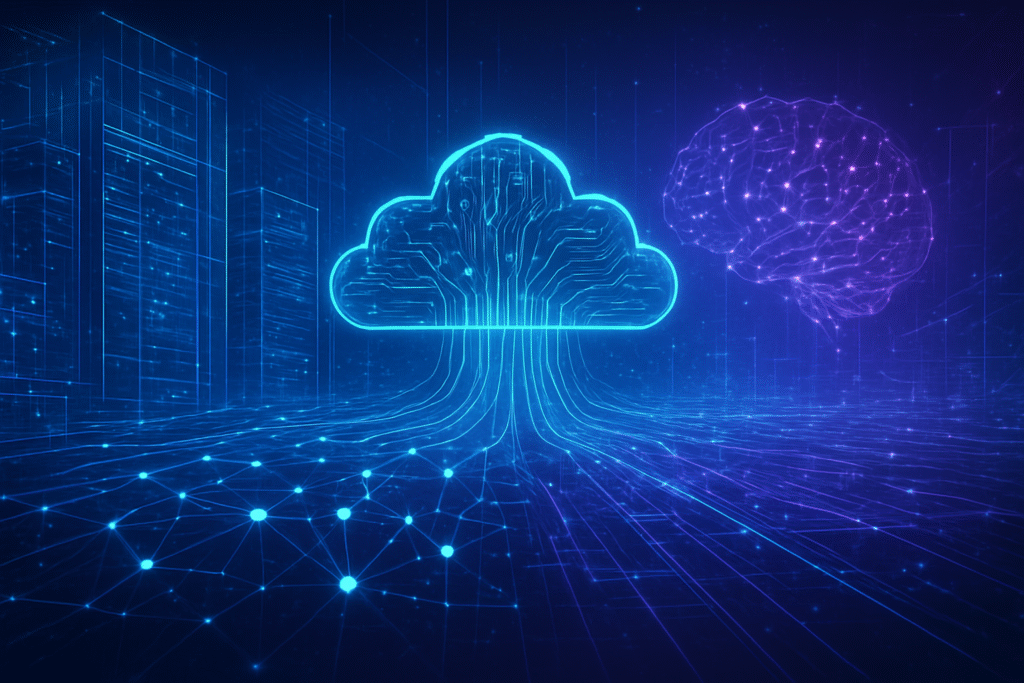Financial News
OpenAI Forges $38 Billion AWS Alliance, Reshaping Cloud AI Landscape

San Francisco, CA & Seattle, WA – November 3, 2025 – In a seismic shift within the artificial intelligence ecosystem, OpenAI and Amazon Web Services (AWS) have today announced a monumental seven-year strategic partnership valued at an estimated $38 billion. This landmark agreement sees OpenAI, the trailblazing AI research and deployment company behind ChatGPT, diversifying its critical cloud infrastructure, ending its exclusive reliance on Microsoft Azure, and tapping into AWS's formidable compute power to fuel its ambitious AI development roadmap. The deal underscores the escalating demand for high-performance computing in the race for advanced AI, signaling a new era of multi-cloud strategies for the industry's leading innovators.
The immediate significance of this partnership reverberates across the tech world. For OpenAI, it represents an unprecedented scaling opportunity, providing access to vast, cutting-edge GPU resources essential for training its next-generation models and expanding the reach of its existing services. This move, made possible by a recent amendment to its Microsoft partnership, grants OpenAI greater independence and operational resiliency. For Amazon (NASDAQ: AMZN), the deal is a resounding validation of AWS's capabilities, cementing its position as a premier infrastructure provider for the most demanding AI workloads and delivering a substantial revenue boost. The broader AI industry is now keenly observing this pivot, recognizing it as a harbinger of a multi-cloud future where access to specialized compute is the ultimate strategic asset.
Unpacking the Technical Foundation of a New AI Era
The technical backbone of this $38 billion alliance is rooted in massive, dedicated compute capacity designed to meet OpenAI's insatiable demand for processing power. Under the terms of the agreement, OpenAI will gain immediate and extensive access to hundreds of thousands of NVIDIA (NASDAQ: NVDA) GPUs, specifically the highly anticipated GB200s and GB300s, hosted on Amazon EC2 UltraServers. These state-of-the-art GPU clusters are engineered to deliver unparalleled performance for large-scale AI model training and inference, offering significant advancements over previous generations in terms of computational throughput and energy efficiency. The deal also accounts for the ability to scale to tens of millions of CPUs, crucial for supporting the increasingly complex agentic workloads that define the frontier of AI.
AWS is not merely providing off-the-shelf cloud resources; it is committed to building out and deploying dedicated infrastructure optimized specifically for OpenAI's demanding AI processing requirements. This bespoke approach ensures maximum efficiency and performance, with initial capacity expected to be fully operational by the end of 2026, and provisions for further expansion extending into 2027 and beyond. This tailored infrastructure differs significantly from standard cloud deployments, reflecting a deeper, more integrated partnership where AWS acts as a strategic enabler for OpenAI's core mission.
Initial reactions from the AI research community and industry experts highlight the critical nature of this compute-centric deal. Sam Altman, CEO of OpenAI, emphasized that this partnership "strengthens the broad compute ecosystem essential for the next era of AI," underscoring the strategic importance of diverse and robust infrastructure. Analysts point to the sheer scale of the investment as a clear indicator of the compute intensity required for artificial general intelligence (AGI) development, suggesting that access to such resources will increasingly differentiate leading AI labs. The move also signals a maturation in the cloud market, where providers are now vying to offer highly specialized, bespoke solutions for cutting-edge AI.
Reshaping the Competitive Landscape: Winners, Losers, and Disruptions
This colossal deal sends ripples throughout the AI and cloud computing industries, immediately impacting major players and setting new competitive dynamics. Foremost among the beneficiaries is, of course, Amazon Web Services (AWS), which secures a massive, long-term revenue stream and a significant validation of its infrastructure prowess from one of the world's most prominent AI innovators. This win bolsters AWS's competitive standing against rivals like Microsoft Azure (NASDAQ: MSFT) and Google Cloud (NASDAQ: GOOGL), demonstrating its capability to attract and support the most demanding AI workloads. NVIDIA also stands to benefit immensely, as the deal guarantees the deployment of a vast number of its cutting-edge GPUs, further solidifying its dominant position in the AI hardware market.
The competitive implications for Microsoft are particularly noteworthy. While OpenAI's partnership with Microsoft (NASDAQ: MSFT) remains strategically important, this AWS deal signals an end to OpenAI's exclusive cloud reliance, potentially diluting Microsoft's unique advantage as OpenAI's primary infrastructure provider. This forces Microsoft to re-evaluate its AI cloud strategy, possibly accelerating its own investments in specialized AI infrastructure and services to maintain its competitive edge. Google Cloud, too, will feel increased pressure to secure similar high-profile AI partnerships, especially as the industry shifts towards multi-cloud strategies.
For AI startups and smaller labs, this development highlights both opportunities and challenges. While the deal underscores the financial and infrastructural barriers to entry in frontier AI research, it also validates the multi-cloud approach, suggesting that startups might have more options for specialized compute in the future. However, the sheer scale of investment required for such partnerships could further consolidate power among the largest tech giants, potentially disrupting smaller cloud providers who cannot offer the same level of dedicated, cutting-edge infrastructure. The market positioning of all major cloud providers will now be heavily influenced by their ability to court and secure similar high-value AI compute contracts.
Wider Significance: The Dawn of Multi-Cloud AI and Compute as Currency
The $38 billion partnership between OpenAI and AWS fits seamlessly into the broader AI landscape as a definitive marker of several accelerating trends. Firstly, it emphatically confirms the "insatiable demand" for compute power as the primary currency in the race for advanced AI. The scale of this investment makes it clear that developing and deploying frontier AI models requires an unprecedented level of computational resources, making access to cutting-edge GPUs and scalable infrastructure a critical strategic advantage. This deal elevates compute from a utility to a central, defining factor in AI innovation.
Secondly, this alliance heralds the definitive arrival of the multi-cloud AI era. OpenAI's decision to diversify its infrastructure beyond Microsoft Azure signals a broader industry trend where even the most deeply integrated partnerships will yield to the strategic imperative of resiliency, cost optimization, and access to the best-of-breed hardware from various providers. This move challenges the notion of single-provider exclusivity in the AI infrastructure space, suggesting that future major AI players will likely adopt hybrid or multi-cloud strategies to mitigate risks and leverage diverse strengths. This shift could lead to more complex, but ultimately more robust, AI development ecosystems.
Potential concerns arising from such massive deals include the further concentration of AI power among a few well-resourced entities, potentially exacerbating the "AI divide." However, it also presents an opportunity for cloud providers to innovate further in specialized AI infrastructure, potentially benefiting a wider range of developers in the long run. Comparisons to previous AI milestones, such as the initial breakthroughs in deep learning or the rise of large language models, suggest that access to scalable, high-performance compute has always been a bottleneck. This deal directly addresses that bottleneck on an unprecedented scale, setting a new benchmark for infrastructure investment in AI.
The Horizon: Future Developments and Uncharted Territories
Looking ahead, this partnership is expected to catalyze a cascade of near-term and long-term developments across the AI and cloud sectors. In the near term, we can anticipate a rapid acceleration in OpenAI's model training capabilities, potentially leading to the announcement of even more powerful and versatile AI models. The dedicated AWS infrastructure will enable faster iteration cycles and more ambitious research projects, pushing the boundaries of what AI can achieve. We will also likely see AWS further refine its AI-optimized cloud offerings, leveraging insights gained from supporting OpenAI's cutting-edge workloads to benefit its broader customer base.
On the horizon, potential applications and use cases are vast. With enhanced compute, OpenAI could accelerate the development of highly sophisticated agentic AI systems capable of complex problem-solving and autonomous operation across various domains, from scientific discovery to personalized education. The deal could also pave the way for more robust and scalable deployments of AI in enterprise settings, as companies gain confidence in the underlying infrastructure. Experts predict that the increased compute availability will enable the exploration of entirely new AI architectures and paradigms that were previously computationally infeasible, potentially leading to breakthroughs in areas like multimodal AI and embodied AI.
However, challenges remain. The sheer energy consumption of such massive AI training operations is a significant concern, requiring continued innovation in sustainable computing. Furthermore, managing the security and ethical implications of increasingly powerful AI models at this scale will be paramount. Experts predict that the next phase will involve a fierce competition among cloud providers to offer not just raw compute, but also highly specialized software stacks, development tools, and security features tailored for advanced AI. What to watch for next includes announcements of new AI models from OpenAI, further strategic partnerships in the cloud AI space, and continued innovation in energy-efficient AI hardware.
A New Chapter in AI History: Compute as the Cornerstone
The $38 billion AI deal between OpenAI and Amazon marks a pivotal moment in the history of artificial intelligence, underscoring the critical and escalating role of compute infrastructure in driving the next wave of innovation. Key takeaways from this monumental partnership include OpenAI's strategic shift to a multi-cloud approach, AWS's definitive validation as a premier AI cloud provider, and the industry-wide recognition that massive, specialized compute is now the most valuable resource in the race for advanced AI. This alliance is not merely a financial transaction; it is a strategic maneuver that will reshape competitive landscapes, accelerate technological development, and redefine the alliances within the tech industry.
This development's significance in AI history cannot be overstated. It solidifies the trend of "compute as currency," where access to vast GPU resources dictates the pace and scale of AI progress. It also signals a maturation of the cloud market, moving beyond general-purpose computing to highly specialized, bespoke solutions for cutting-edge AI workloads. The long-term impact will likely see an even greater concentration of advanced AI development within ecosystems supported by major cloud providers, while simultaneously fostering innovation in multi-cloud management and specialized hardware.
In the coming weeks and months, the tech world will be closely watching for several indicators. We can expect further details on the deployment of the NVIDIA GB200 and GB300 GPUs within AWS, announcements from OpenAI regarding new model capabilities enabled by this expanded compute, and potential counter-moves or similar strategic partnerships from rival cloud providers like Microsoft Azure and Google Cloud. This deal has set a new benchmark for AI infrastructure investment, and its reverberations will continue to shape the future of artificial intelligence for years to come.
This content is intended for informational purposes only and represents analysis of current AI developments.
TokenRing AI delivers enterprise-grade solutions for multi-agent AI workflow orchestration, AI-powered development tools, and seamless remote collaboration platforms.
For more information, visit https://www.tokenring.ai/.
More News
View More




Recent Quotes
View More
Quotes delayed at least 20 minutes.
By accessing this page, you agree to the Privacy Policy and Terms Of Service.



